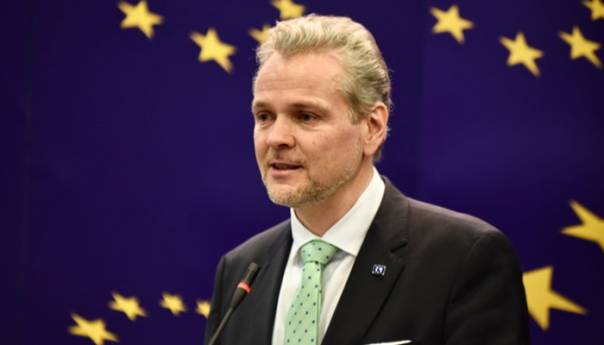The Special Representative and Head of the European Union Delegation to Bosnia and Herzegovina, Ambassador Johann Sattler wrote in his blog that two days ago he was standing among white tombstones in Potočari where he laid a wreath for genocide victims with his colleagues from the European Union, heads bowed in remembrance and in silence. The blog post follows below in its entirety.
Two days ago, I stood among the white gravestones at Potočari and, along with my EU colleagues, laid a wreath for the victims, our heads bowed in remembrance, and in silence.
Silence is the only appropriate response when confronted with the scale of what happened at Srebrenica. But so is resolve. The resolve to do whatever is humanly possible to prevent hatred from taking root, spreading and being acted upon.
To prevent evil, we need to look at its core and confront it. The facts must be documented, the guilty brought to justice and all victims identified and laid to rest. Rebuilding – on a foundation of truth and justice – is a necessary and fitting tribute of the living to the dead. It is a meaningful rejection of everything those who committed the crime sought to achieve. It is also a refutation of those who tried to cover up the crime, as well as of those who – even today – try to deny that it took place.
The Srebrenica Memorial Center is key to remembrance, research and education on the 1995 genocide, thus its preservation is of the utmost importance. The efforts of the Memorial Center have the full support of the European Union, which has provided funds for the recent expansion and rehabilitation of the Archives and previously for the inscription of names of the victims on the Potočari Cemetery Memorial Wall.
The work of recovery, however, depends on more than practical assistance or the allocation of funds. It primarily takes place in people’s hearts, a process that is harder to quantify, yet even more important to sustain. This is exactly what happens in the House of Good Tones, which I also visited when I was in Srebrenica. It is a place pulsating with the possibilities of creativity, talent, and, above all, optimism. It is a place where young people from Srebrenica and Podrinje make music, watch films, explore language and literature and take part in activities that bring new generations together. I also visited the Guber Spa springs, which in their own way can be part of the rehabilitation process by reviving Srebrenica’s ancient tradition as a place of healing.
As I drove back to Sarajevo, I was deeply conscious of the broader obligation that rests with the people of Bosnia and Herzegovina and the people of Europe. We cannot simply wring our hands and express regret – we must change things. Building a better society is the only real way of honoring those who were murdered at Srebrenica, and those who perished all across Bosnia and Herzegovina in the 1990s.
Building a society in which citizens can live in dignity is what European integration is all about. It means rejecting the fear and hatred that led to the events of Srebrenica, as well as rejecting the divisive and inflammatory rhetoric that creates division and contradicts the most fundamental European values. Embracing the ideals of solidarity and inclusiveness is what will lead to a better future.
I returned from Srebrenica with a renewed conviction that decency and resilience – two things that are inscribed in the human spirit – will prevail. Listening to the young people making music in the House of Good Tones I thought of one of the lines written by poet Rainer Maria Rilke: “The future enters into us, in order to transform itself in us, long before it happens.” If young people such as those I met in Srebrenica are given a chance to lead that process, then a brighter future surely awaits.
